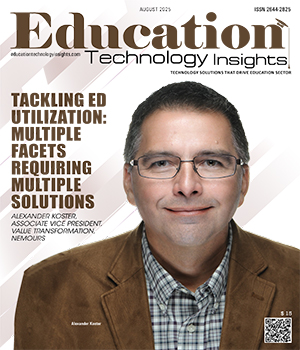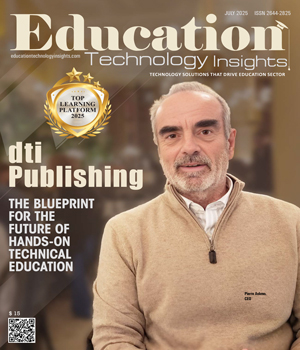THANK YOU FOR SUBSCRIBING
Be first to read the latest tech news, Industry Leader's Insights, and CIO interviews of medium and large enterprises exclusively from Education Technology Insights
Enhancing Program Management Through A Comprehensive Approach
Wendy Yeung, Programme Manager, The University of Hong Kong
Education technology is not only a growing trend but also an indispensable component of modern educational systems. Incorporating it into program design has proven to be advantageous, leading to more effective and engaging learning experiences. Implementing education technology primarily involves integrating hardware and software tools such as Digital whiteboard, Padlet, Flip, Perusall, and interactive devices into the learning environment. Analyzing the effectiveness of these tools is crucial in understanding how well a program incorporates technology and fosters student success.
The 6M Method for Evaluating Education Technology, adapted from the 6M manufacturing concept, is applied to assess the efficiency of program design with education technologies. This method examines six key components: 1. Machines (Tools): The hardware and software used in the learning process, such as ChatGPT, e-classroom, zoom, electronic blackboard, 3D projector, etc.
2. Manpower (Teaching Staff): Both pre-service and in-service teacher training are essential, especially for in-service teachers who may lack knowledge about education technologies. Adapting to new trends can be challenging, and adequate training is vital.
3. Methods (Teaching mode): Flexibility in how knowledge is delivered is crucial. Incorporating games, project collaboration, observation, debates, and simulations through technologies can enrich the program. Education technologies can engage students and promote immersive learning.
"As the landscape of education technology continues to evolve, program management must effectively monitor and assess all aspects of the learning process "
4. Materials (Content): It is the teacher's ability and responsibility to develop teaching content based on their academic strength.
5. Mother Nature (Infrastructure): Infrastructure support for education technologies, such as bandwidth, is a basic requirement often overlooked by institutions. Insufficient bandwidth can result in negative feedback.
6. Measurement (Assessment): Assessing the suitability of the program for education technologies is crucial. It is important to develop an assessment of the effectiveness of applying education technologies while avoiding driving wrong behaviour.
While education technologies offer significant advantages, not all subjects are suitable for their application. Blindly following the trend can lead to undesirable outcomes. In Hong Kong, the integration of education technologies in tertiary institutions has made significant progress. However, the current focus on hardware does not fully capture the effectiveness of these technologies in enhancing the learning experience. To optimize the impact of education technologies, it is necessary to shift focus beyond hardware and examine all aspects of the learning process. One critical area to address is manpower. In-service teachers may not be familiar with the latest technologies, which can hinder their ability to utilize these tools effectively. Providing comprehensive training and support for in-service teachers is crucial to achieving this goal. Our institution was developed several workshops and seminar constantly to introduce the toolkit of EdTech for all. It can really help to promote the Edtech knowledge.
As the landscape of education technology continues to evolve, program management must effectively monitor and assess all aspects of the learning process. Designing a program becomes more challenging as educators must determine how best to integrate education technology and create a compelling and valuable experience for students. By adopting a holistic approach, focusing on manpower and innovative assessment methods, the true potential of education technology in modern education systems can be realized.
Read Also
Empowering Leadership through Innovation in Higher Education
The New Era of Education
Redefining Readiness: A Path Toward a Technology-Agnostic Future
Pioneering STEM Education for a Future of Innovators
The Indispensable Role of Emotional Intelligence in K-12 Technology Leadership
Tools over Solutions

I agree We use cookies on this website to enhance your user experience. By clicking any link on this page you are giving your consent for us to set cookies. More info






















